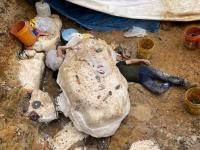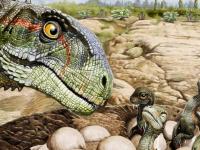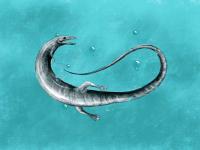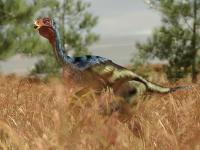How The Study Of Dinosaurs Could Help Us

China’s leading paleontologist on why the country has emerged as a dinosaur hub and how the discipline can help us navigate the climate crisis.
Before he became China’s best-known paleontologist Xu Xing had wanted to be many other things: an Einstein-inspired physicist and a Shaolin monk, a Karl Marx inspired economist, and a C++ programmer. His admission letter to Peking University (PKU) indicated paleontology as his major, the only option on offer. It was a rationed spot at the famed university that was offered to only a handful of students from his home province of Xinjiang. In Xu’s mind, however, thoughts about dinosaurs were as non-existent as real ones.
Today, at 50, Beijing-based Xu is the “go-to-man in China for anything people want to know about dinosaurs,” paleontologist Paul Barrett, from London’s Natural History Museum, once said. Xu is based in the Institute of Vertebrate Paleontology and Paleoanthropology (IVPP) in Beijing under the Chinese Academy of Sciences and is credited with discovering over 70 new prehistoric species, the most for any verterbrate palaeontologist living today. One of Xu’s discoveries is the controversial four-winged Microraptor from Liaoning, discovered in 2003, which challenged the mainstream view that the ability to fly, as it developed in ground-dwelling dinosaurs, was powered to lift the reptiles off the ground. Xu’s Microraptor offered a different position: that flight developed with dinosaurs who were gliding down from trees. “Nearly 15-20 years later, we have new data and new analysis to support our hypothesis,” he says.
Outside the ninth floor window of Xu’s office, Beijing’s skies are hazy with pollution. Fossils from South Korea, part of his ongoing research, are lined neatly near a microscope. Xu agrees that paleontology research, unlike cutting edge communication technologies, is not going to boost the country’s GDP. “For the general public, the very first question would be: what’s the use of this? Science is basically about understanding the world we live in at a fundamental level, but also, in building a knowledge system. Paleontology is part of this big knowledge system. It can help human beings better survive in the future.”
The last two decades have witnessed active digging and excavating globally, says Xu, but China has somehow emerged as the hub for dinosaurs. “The reason that is China and some other countries were less explored previously, so the discoveries here are more likely to be new ones which also makes it scientifically more important,” he says.
Fossils have been discovered across 21 of China’s 34 provinces and autonomous regions. In a recent talk at the Polish Embassy in Beijing, Xu said the discoveries span periods of 200 to 66 million years ago, from the Early and Middle Jurassic hotbeds in Sichuan and Yunnan provinces, to the Cretaceous fossils at Liaoning. In fact, Zhucheng in Shandong province has the largest dinosaur fossil find where 7,600 fossils were recovered from a 300 m-long pit. The Zhucheng Geopark is currently closed for renovations till 2021 when it will be opened as a theme park and footprint museum.
“We were very lucky. When we started working we immediately found some new species,” he says. These discoveries are partly because of luck in spotting sedimentary rocks close to the surface. Fossils have also been uncovered at an astonishing rate as the ground gets dug up to accommodate more high-rises to meet the demands of China’s booming housing sector. Over the years, local people, too, have come forward to share their accidental finds, mostly for free.
By the mid-’90s, after a “typical” undergraduate life of not caring much for his subject, Xu developed a deep interest in paleontology. By 1999, he had co-authored a paper about the Beipiaosaurus, named after Beipiao in Liaoning province in northeast China and amongst the largest dinosaurs from the early Cretaceous period. During this time, he had learned how to camp out for 40 days in the Gobi desert, how to convert a makeshift kitchen into a portable case for fossils, and why summer is the best time to go digging. There was also a lot of luck.
“There was a time when a camera crew asked us to pretend to dig in the desert for good visuals, my colleague threw his hat in the wind to narrow down on a random spot. He started digging there and found a new species!” says Xu, with a laugh.
“The mid-90s was a very good time for doing science in China,” he says. The first big change was the internet. “If you wanted to contact people in those days outside China, the only way you can do so is by writing letters and the international post was very expensive. It was important for us to keep updated on new work in our field and the internet changed that.”
With that brought a network of the “best minds” in the field. “Paleontology is an international science and there are a lot of collaborations since you have to compare lots of different species from across the globe. For that reason you have more visitors from outside the country than other scientific disciplines in China,” says Xu.
As a climate crisis grips the world, Xu says there is much to learn from paleontology on the interactions between life and the environment. “Paleontology can do empirical study on extinction and that is really important for us to understand. Not just at an individual level but species and fossil records show multiple evidence of mass extinctions. Several palaeontologists are studying the fate of whole eco-systems. Those things without paleontology will be hard to understand,” he says.
Source: https://indianexpress.com








